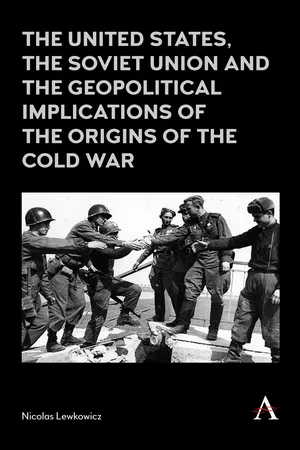
The United States, the Soviet Union and the geopolitical implications of the origins of the Cold War
- 240 pages
- English
- ePUB (mobile friendly)
- Available on iOS & Android
The United States, the Soviet Union and the geopolitical implications of the origins of the Cold War
About this book
'The United States, the Soviet Union and the Geopolitical Implications of the Origins of the Cold War, 1945–1949' describes how the United States and the Soviet Union deployed their hard and soft power resources to create the basis for the institutionalization of the international order in the aftermath of World War Two. The book argues that the origins of the Cold War should not be seen from the perspective of a magnified spectrum of conflict but should be regarded as a process by which the superpowers attempted to forge a normative framework capable of sustaining their geopolitical needs and interests in the post-war scenario. 'The United States, the Soviet Union and the Geopolitical Implications of the Origins of the Cold War, 1945–1949' examines how the use of ideology and the instrument of political intervention in the spheres of influence managed by the superpowers were conducive to the establishment of a stable international order. It postulates that the element of conflict present in the early period of the Cold War served to demarcate the scope of manoeuvring available to each of the superpowers and studies the notion that the United States and the Soviet Union were primarily interested in establishing the conditions for the accomplishment of their vital geostrategic interests. This required the implementation of social norms imposed in the respective spheres of influence, a factor that provided certainty to the spectrum of interstate relations after the period of turmoil that culminated with the onset of World War Two.
Frequently asked questions
- Essential is ideal for learners and professionals who enjoy exploring a wide range of subjects. Access the Essential Library with 800,000+ trusted titles and best-sellers across business, personal growth, and the humanities. Includes unlimited reading time and Standard Read Aloud voice.
- Complete: Perfect for advanced learners and researchers needing full, unrestricted access. Unlock 1.4M+ books across hundreds of subjects, including academic and specialized titles. The Complete Plan also includes advanced features like Premium Read Aloud and Research Assistant.
Please note we cannot support devices running on iOS 13 and Android 7 or earlier. Learn more about using the app.
Information
Table of contents
- Cover
- Half Title
- Title Page
- Copyright Page
- Contents
- Acknowledgments
- Chapter One Introduction
- Chapter Two The Institutionalization Of The Postwar International Order
- Chapter Three The German Question And The Deinstitutionalization Of The International Political System (1871–1945)
- Chapter Four The Patterns Of The Institutionalization Of The Cold War International Order
- Chapter Five American Geopolitical Interests In Western Europe
- Chapter Six The Role Of Ideology In The Scheme Of Intervention Exercised By The United States In Western Europe
- Chapter Seven Soviet Security Needs And The Institutionalization Of The Postwar International Order
- Chapter Eight Communist Ideology And The Formulation Of Soviet Foreign Policy In The Postwar Era
- Chapter Nine Conclusion: The Geopolitical Implications Of The Origins Of The Cold War
- Bibliography
- Index